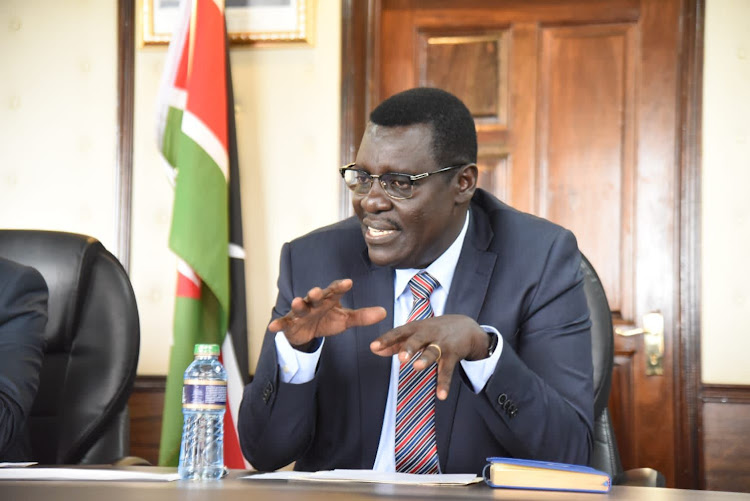- This was after the government seconded employees from other agencies following an administrative action by then-President Uhuru Kenyatta.
- The PS also raised issues as to why some Kemsa employees were working from home and instructed the CEO to recall all of them.
Former Medical Services Principal Secretary Peter Tum wrote to the Kenya Medical Supplies Agency raising the red flag on the bloated workforce, it has emerged.
In his April 14 letter to Kemsa Chief Executive Officer Terry Ramadhani (suspended), Tum questioned the agency's staffing, saying the number exceeded the approved staff establishment.
"Kemsa's staff establishment as per the approved instruments stands at 378 against an in-post of 910 employees," Tum said in his letter.
He said initially before the review of the human resource instruments, the authority had an approved staff establishment of 348.
Tum, who was on Tuesday moved to the Sports, Arts and Culture department, observed that the number of staff jumped from 378 to 910 in 2021.
This was after the government seconded employees from other agencies following an administrative action by then-President Uhuru Kenyatta.
The PS also raised issues as to why some Kemsa employees were working from home and instructed the CEO to recall all of them.
Tum in April instructed the Kemsa CEO to recall all employees and those on contract that were working from home.
"Recall all the officers who are working from home. Fast-track the exit of employees of the authority serving on contract per the existing legal framework. This will address the problem of a bloated workforce," the PS directed.
They had been locked out of their offices in a 2021 executive order and have been working from home for 19 months.
"Several Kemsa officers are working from home for over a year. There is a caretaker team drawn from wider public service performing the duties of the officers who are working from home. Kemsa also recruited officers on short-term contracts to perform duties of the officers working from home," Tum wrote in April 14 letter.
He also raised issues regarding the re-engagement of staff who he said continued to draw salaries even after the project had expired.
In Tum's letter, it also emerged that the employees working from home had taken Kemsa to court with the PS calling for an out-of-court settlement.
"Kemsa should negotiate with the officers who are in court for a possible out-of-court settlement. Undertake comprehensive business re-engineering to address some of the systemic challenges facing the authority," Tum said.
Documents seen by the Star show that some 350 employees were working from home.
Tum was responding to a letter by the CEO seeking concurrence of the ministry to implement a voluntary early retirement for the staff working from home as a way of addressing the issue of a bloated workforce.
Tum advised Ramadhani to release the caretaker team and those on secondment to their respective employees.
On Monday, Ramadhani was suspended alongside eight other officers. This followed a botched Global Fund tender. By James Mbaka, The Star






